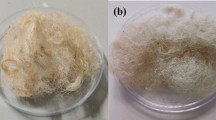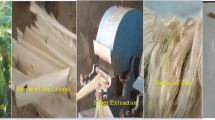Abstract
DURING the course of investigations on bacterial disintegration of raw wool, the presence of Actinomycetes in rotted wool was often noted. These organisms, however, rarely appeared in culture, perhaps because of the prevalence of Pseudomonas aeruginosa the antagonistic effects of which are well known. Eventually Actinomycetes were isolated from nutrient agar cultures of at least one month's growth when these had been left to dry out at room temperature. Under these conditions aerial hyphæ appeared, from which pure cultures of the organisms were obtained.
This is a preview of subscription content, access via your institution
Access options
Subscribe to this journal
Receive 51 print issues and online access
$199.00 per year
only $3.90 per issue
Buy this article
- Purchase on Springer Link
- Instant access to full article PDF
Prices may be subject to local taxes which are calculated during checkout
Similar content being viewed by others
References
Burgess, R. J., J. App. Bact., 17, 230 (1954).
Mendels, G. R., Stahl, W. H., and Levinson, H. S., Textile Res. J., 4, 224 (1948).
Dry, F. W., J. Text. Inst., 24, T161 (1933); N.Z. J. Agric., 46, 10, 141, 279 (1933); N.Z. J. Agric., 48, 331 (1934).
Speakman, J. B., Proc. Int. Wool Text. Conf., E, 531 (1955).
Author information
Authors and Affiliations
Rights and permissions
About this article
Cite this article
PHILIPSON, M. Actinomycete Disintegration of Raw Wool. Nature 180, 1205–1206 (1957). https://doi.org/10.1038/1801205b0
Issue Date:
DOI: https://doi.org/10.1038/1801205b0
This article is cited by
-
Discoloration of Wool Fibres by a Fungus
Nature (1959)
Comments
By submitting a comment you agree to abide by our Terms and Community Guidelines. If you find something abusive or that does not comply with our terms or guidelines please flag it as inappropriate.



